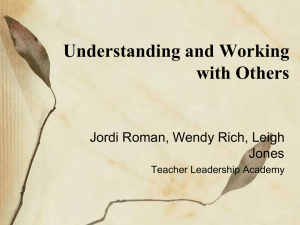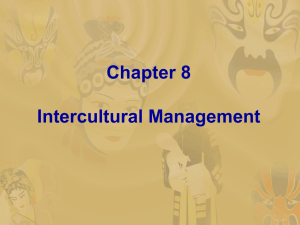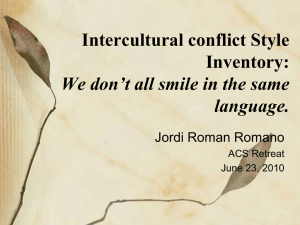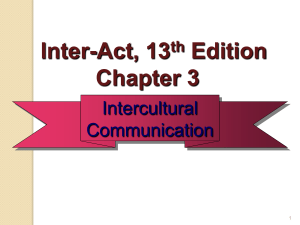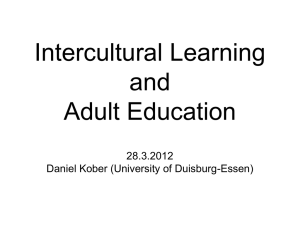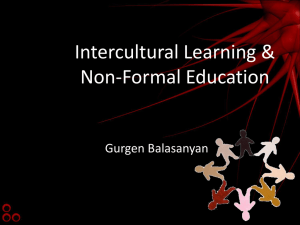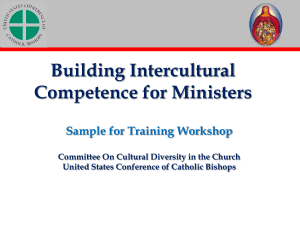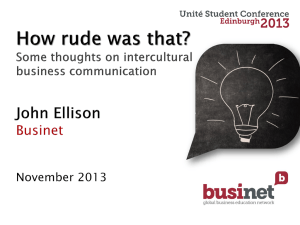IDC and IDI - Napa Valley College
advertisement
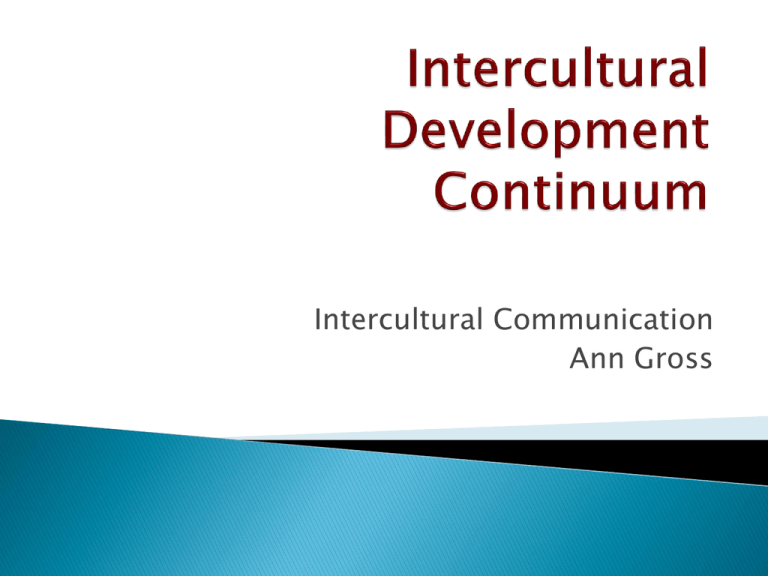
Intercultural Communication Ann Gross Grounded theory (evidence based), used to explain predictable stages people go through, based on their intercultural experiences Based on The Developmental Model of Intercultural Sensitivity (DMIS), created by Dr. Milton Bennett, Co-Director of the Intercultural Communication Institute, Portland Oregon Predicts intercultural communication competence – ability to communicate effectively and appropriately in a variety of contexts Requires culturally sensitive knowledge, a motivated mindset and skill set Person focuses appropriately on cultural commonalities and cultural differences Development follows predictable stages ◦ Cultural Generalization – statement of probability based on systematically collected data; tendency of a majority of cultural group members ◦ Stereotype – application of a cultural generalization to every member in a cultural group, or generalizing from only a few group members In intercultural interactions, need to find some balance between the two At different stages on IDC, person tends to focus more on one or the other Attitudes toward cultural differences also change through the stages Monocultural Mindset – ◦ Use own cultural values and practices to make sense of other culture’s differences and similarities ◦ Rely on broad stereotypes ◦ Less complex understanding of other cultures Intercultural/Global Mindset – ◦ Make sense of differences and similarities using one’s own and other cultures’ values and practices. ◦ Use cultural generalizations to help understand complex differences and commonalities. Other cultures viewed through lens of one’s own culture When people have not interacted in depth with other cultures; may avoid interaction Overly simple views of other cultures; stereotypes Seem accepting, but have a tendency to dehumanize outsiders Focused on cultural differences, which are seen as negative or threatening Dualistic thinking (good/bad; us vs. them) Two Forms: ◦ Defense – Uncritical of own culture, more critical of other; exclusion of others; backlash actions ◦ Reversal – Overly critical of own culture, uncritical of other cultures Highlight cultural commonalities and universal values and principles, but may overlook cultural differences Accept superficial cultural differences, but think all humans are basically the same (“Like me”) Tendency to define commonality in ethnocentric terms (own culture seen as everyone’s reality) Can lead to acceptance of institutionalized privilege Able to view interactions from multiple cultural perspectives Recognize that all cultures are equally complex and valid Beginning of ability to interpret behavior, values, perceptions etc. within a cultural context Acceptance does not mean that one likes or approves of all aspects of each culture Can lead to “liberal paralysis” – fear of being judgmental or taking action Able to “Talk the talk,” but not yet “Walk the walk” Development of a flexible mindset and skillset needed for intercultural communication competence Ability to see things from others’ points of view (empathy), and Ability to adapt behaviors to act in culturally appropriate ways Intercultural Development Inventory (IDI) Reliable and valid cross-cultural self-assessment instrument for individual feedback related to the Intercultural Development Continuum Used as a tool to target most appropriate intercultural communication training for person Developed and validated by Dr. Milton Bennett and Dr. Mitchell Hammer (Professor of Intercultural Communication, The American University, Washington, DC) • • • • • • Denial Polarization (Defense/Reversal) Minimization Acceptance Adaptation Cultural Disengagement (sense of not belonging to a culture)


